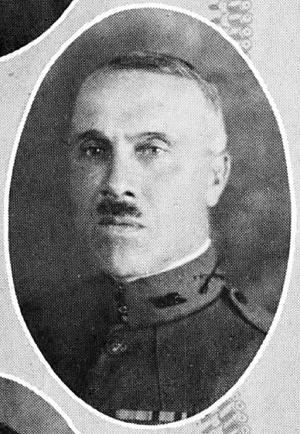

Dwight Warren Ryther
Commanding Officer 22nd Infantry
August 25, 1923 - October 1, 1925
Dwight W. Ryther was born in Evans, Erie County, New York on May 24, 1869.
On June 16, 1887 he entered the
US Military Academy and left on January 15, 1889
without graduating.
Ryther enlisted as a Private in
Company C of the 6th Infantry on October 5, 1892 at Fort Thomas,
Kentucky.
His enlistment record indicated he stood 5 feet 7 ¾ inches tall,
had light brown hair, blue eyes and a light complexion.
His previous occupation was listed as School teacher.
While with the 6th Infantry he was promoted to Corporal and then Quartermaster Sergeant.
On November 6, 1895 Ryther was offered a commission as a 2nd Lieutenant of the 2nd Infantry.
On November 10, 1895 he was
discharged from his enlistment with a character reference of
Excellent
and on November 11 he accepted the appointment to 2nd Lieutenant.
On December 2 of the same year he transferred back to the 6th Infantry.
He was with the 6th Infantry
during the assault on San Juan Hill in the Spanish American War,
taking over command of his Company when its Commander was
wounded. Interestingly,
the 6th Infantry was led at that time by Lieutenant Colonel Harry
Egbert, who would be promoted
to Colonel and take command of the 22nd Infantry the following
day.
The following is the report of 2nd
Lieutenant D.W. Ryther of the action in which he assumed command
of
Company C 6th Infantry during the assault on San Juan hill in
Cuba 1898.
from the Annual Reports to the Secretary of War 1899:
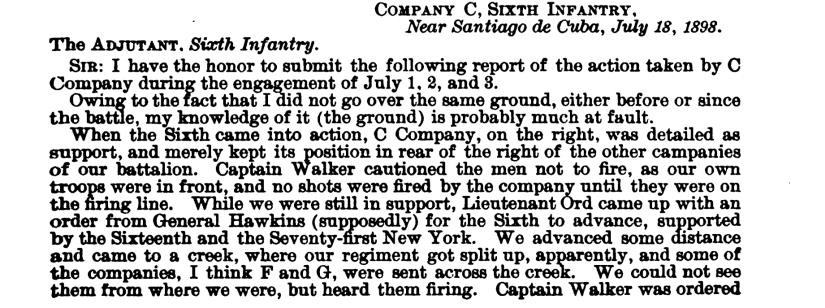
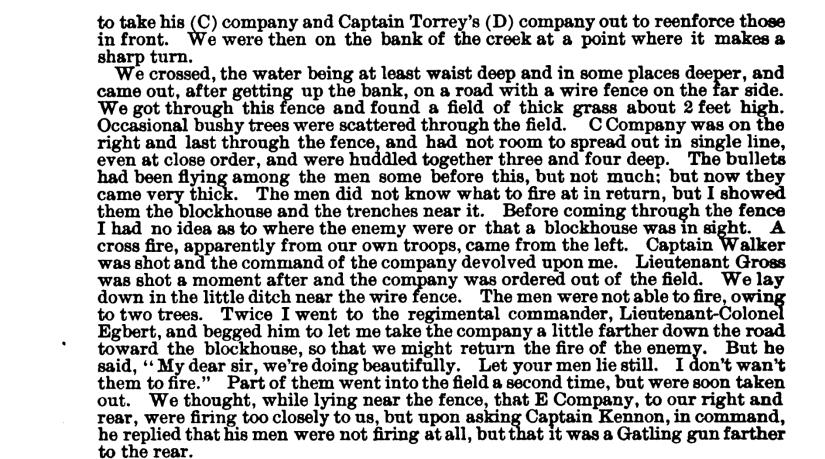
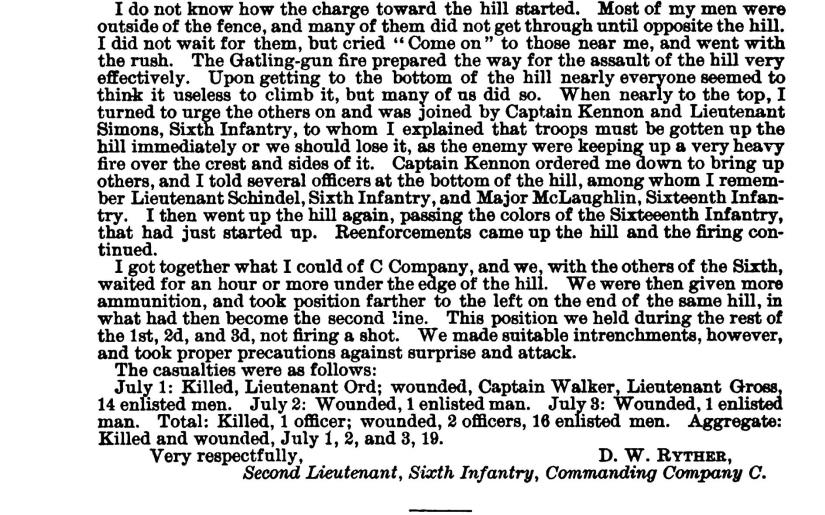
On August 11, 1898 Ryther was
promoted to 1st Lieutenant and on January 1, 1899 he was
assigned to the 4th Infantry, staying with that unit until
transferring back to the 6th Infantry
on June 19, 1899. On April 1, 1901 he was promoted to Captain of
the 7th Infantry,
transferring back to the 6th Infantry on October 29 of that same
year.
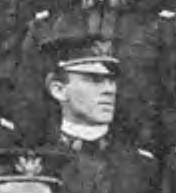
Above: Ryther as a Captain in the 6th Infantry at Fort Leavenworth, Kansas, 1904
Photo from the Army and Navy Register August 6, 1904
Ryther stayed with the 6th Infantry and was involved in the fighting at the Battle of Bud Dajo in 1906.
The following is from the Cleburne New
Era newspaper, May 5, 1906.
It is a letter written to the father of one of the Soldiers that
Ryther commanded,
when he was a Captain and Commanding Officer of Company K 6th
Infantry
in the Philippines during the battle of Bud Dajo.
The following
letter was written to Prof. L.H. Jackson of Edwardsville, whose
son is serving in the regular U.S. Army
in the Philippines, by Capt. D.W. Ryther, Commander Co. K, Sixth
Infantry. We take pleasure in reproducing the
letter in full as it bears the official stamp of daring and
meritorious conduct on the part of young Jackson
who is one of the many American boys in the far off Philippines
who are giving their best days and strength for the
honor of the American flag and the protection of our interests in
the Orient. Their loyalty to the American flag
does not involve the question of the rightfulness of the
government's Philippine policy, it shows that they are
filling the places of true American soldiers. The letter reads as
follows:
Zamboauga, Mindanas, P.I.
March 18, 1906
Prof. L.H. Jackson, Edwardsville, Ala.
My dear sir, Your son has asked me to write you for him as he
will not be able to do so for a few weeks yet.
I know that you will be glad to hear what I have to tell you of
him, and later he can write more fully to you. He has
been through what is probably the fiercest engagment that
American troops have ever had in these islands,
and while he has both hands temporarily disabled, the doctors
tell me that he is doing finely and that before long be back in
the company for duty.
We were taking the fortifications on Mt. Dajo, on the island of
Jolo and had climbed to the top of the mountain.
At the head of the trail was a cotta or stockade with a trench
behind it. Your son was with some others right up
against the stockade and climbed upon it to fire into the trench
behind. He got a bullet through the right hand and fell back,
saying "I am shot" but trying to work his trigger
finger, found he could do so, saying "But I can
still work my right finger, I think I'll get up and try it
again", and did so and was scarcely on the stockage
a second time when he got a bullet through the left arm, near the
elbow. It was one of the bravest things I ever saw and
I am glad to have such a man in my company. He had done some good
shooting before that.
I am recommending him for a certificate of merit which would
bring him a slight increase of pay so long
as he remains in the service, besides being a recognition by the
war department of which any man may justly
be proud. He may not get it but he deserves it and I am doing
what I can to get it for him. He is the only man
of my company whom I am recommending for it. Perhaps you may be
glad to hear that since I have been in command of the
company I have noticed his behavior and have had him made a
corporal. He impresses me as a noble, self respecting soldier.
I am well aware that too many people who are not acquainted with
the army as it is today seem to think
that it is mostly composed of worthless men who are fit for
nothing else; this is not the case, however,
as we find a great number of fine young men in the ranks.
The mail is very irregular so it may be some time before you hear
again from your son.
He seems to be getting along very well, though it will be three
or four weeks probably before he can do any writing.
He is having good care and needs nothing except patience now.
There are trained nurses looking out for
him and the other wounded ones.
Very
respectfully, D.W. Ryther, Capt, 6 Infantry, Comd'g. Co. K
Cleburne County Al Archives News.....Newspaper Notices for MAY 1906 May 1906
On April 19, 1914 Ryther became
unassigned and on July 1, 1916 he was promoted to Major.
On August 5, 1917 he was promoted to Colonel of Infantry in the
National Army, a position
which he accepted on August 16 of that year. He was assigned to
the 87th Division at Camp Pike,
Little Rock, Arkansas where he commanded the 348th Infantry
Regiment of the 174th Infantry Brigade
as the Division was being formed. He served overseas from August
24, 1918 to July 16, 1919.
His unit did not see combat but was used instead as a pool of
laborers and replacements.
He was honorably discharged from
the National Army on August 31, 1919 and reverted back
to his rank of Major in the Regular Army.
On December 24, 1919 he received a promotion to Lieutenant Colonel.
The Army List and Directory for
February 1, 1920 shows Ryther on duty
at the U.S. Disciplinary Barracks at Fort Leavenworth, Kansas.
On July 1, 1920 he was promoted
to Colonel. On that date he was detached and was detailed to
R.O.T.C.
at the University of Georgia at Athens, Georgia where he was a
Professor of Military Science and tactics.
Also in 1920 he graduated from the Army's School of the Line.
His name was placed on the General Staff Corps eligible list.
Ryther assumed command of the 22nd Infantry on August 25, 1923.
The Army List and Directory for
November 1923 shows Ryther in command of the 22nd Infantry
as part of the 4th Division at Fort McPherson, Georgia.
The Army List and Directory for
July 1, 1924 shows Ryther in command of the 22nd Infantry as part
of the
4th Division at Camp McClellan, Alabama, less Company B which was
at Fort McPherson. The Army
List and Directory for January 1, 1925 shows Ryther in command of
the 22nd Infantry as part of the
4th Division at Fort McPherson less Company C which was at Camp
McClellan.
Records from Fort McPherson
indicate Ryther was in command of the Post January 1, 1924 to
October 31, 1925, which is somewhat confusing when compared to
the information found in the above
Army List and Directory.
The Returns of the 22nd Infantry
indicate that Ryther relinquished command of the 22nd Infantry to
Colonel George F. Baltzell on October 1, 1925.
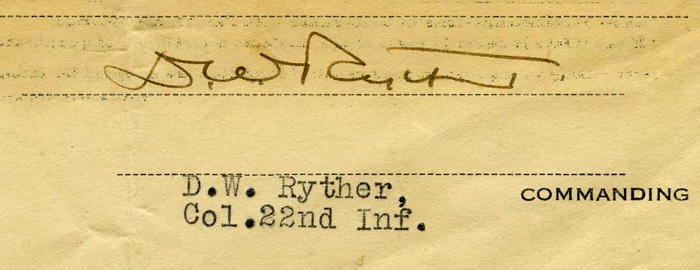
Dwight W. Ryther's
signature as Commanding Officer 22nd Infantry on a graduation
certificate
from the Citizens' Military Training Camp at Camp McClellan,
Alabama dated August 1, 1924.
Webmaster's collection
|
Colonel Dwight W. Ryther Commanding Officer 22nd Infantry Fort McClellan, Alabama 1924 Photo from The Cimitran Webmaster's collection |
Ryther reported for duty with
the 89th Division of the Organized Reserves on January 31, 1926
in Seventh Corps Area at Omaha, Nebraska. He remained with the
Division at least through July 1, 1930.
The Army List and Directory for
April 1, 1931 through January 1, 1933 shows Ryther in command of
the
7th Infantry Regiment as part of the 3rd Division at Vancouver
Barracks, Washington.
Dwight W. Ryther retired from the Army on May 31, 1933.
He was a member of the Military Order of the Carabao.
During his service Ryther
received two Citations from the War Department, which were later
changed to
Silver Star Citations, and then later to Silver Star Medals.
The 1st citation was:
"For gallantry in action against Spanish forces at Santiago, Cuba, July 1, 1898."
The 2nd citation was:
"For gallantry in action against hostile Moros at Bud Dajo, Island of Jolo P.I., March 5 to 6, 1906."
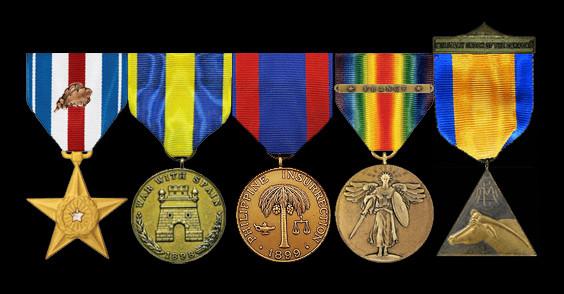
Dwight W. Ryther's decorations
|
Dwight W. Ryther as a Colonel Photo is undated, taken at
Photo courtresy of Julien Woestyn and
Loic Parent |
Dwight W. Ryther died September 8, 1936 at Buffalo, New York
Burial:
North Evans Cemetery
North Evans
Erie County
New York, USA
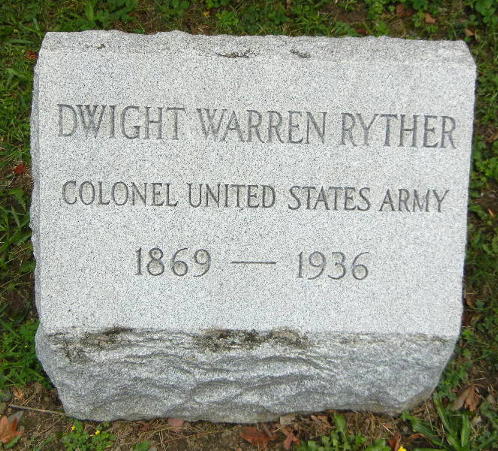
Grave marker for D.W Ryther
Photo by RHam from the Find A Grave website
Top photo of Dwight W. Ryther from:
The Doughboy 1923 Published by the
Classes of 1923, The Infantry School,
U.S. Army, Fort Benning, GA 1923
Home | Photos | Battles & History | Current |
Rosters & Reports | Medal of Honor | Killed
in Action |
Personnel Locator | Commanders | Station
List | Campaigns |
Honors | Insignia & Memorabilia | 4-42
Artillery | Taps |
What's New | Editorial | Links |